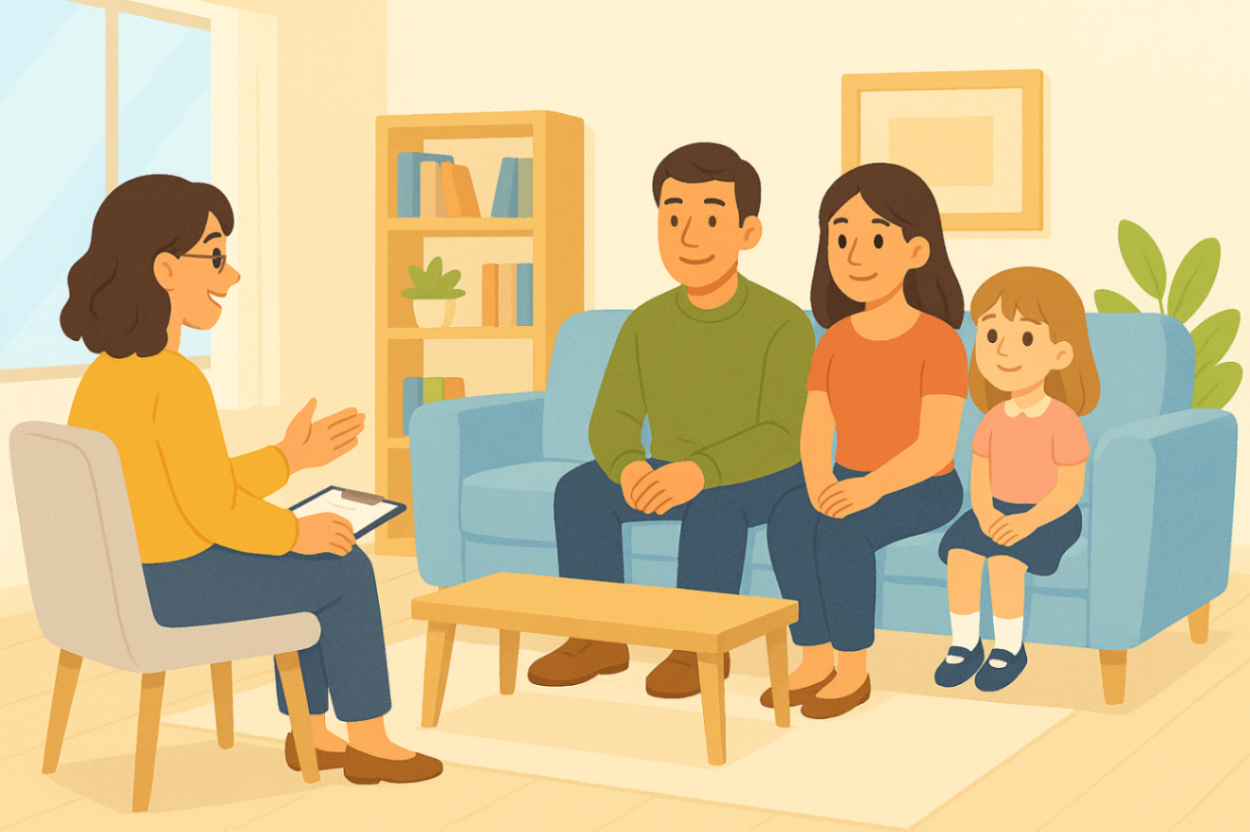
helping families navigate ndis behaviour support
23 June, 2025

Key Highlights
-
Specialised NDIS behaviour support helps families address behavioural challenges while enhancing mental health and daily life experiences.
-
Positive Behaviour Support (PBS) utilises tailored strategies to address behaviours of concern and foster emotional regulation skills.
-
Families collaborate with behaviour support practitioners to create individualised support plans promoting positive change and long-term quality of life improvements.
-
NDIS funding ensures access to therapy services, including early intervention and behavioural analysis.
-
Family involvement is emphasised at every step, ensuring consistent support across home, school, and community environments.
Introduction
Supporting a child with challenging behaviours can be emotionally and mentally demanding. Fortunately, families accessing the NDIS can benefit from structured behaviour support that promotes emotional regulation, daily functioning, and stronger family relationships.
One of the most widely used approaches is Positive Behaviour Support (PBS)—an evidence-based framework that focuses on understanding why behaviours occur and replacing them with positive, functional alternatives. This method not only reduces problem behaviours but also enhances a child’s overall quality of life by building skills and confidence.
For families in Liverpool and surrounding suburbs, understanding how PBS fits within NDIS plans is the first step toward creating a supportive, outcomes-focused environment—at home, school, and in the community.
Understanding NDIS Behaviour Support: Where Families Get Stuck
 The National Disability Insurance Scheme (NDIS) is there to give important behaviour support services. But many families find it hard to use these services. A lot of people do not know how to read the funding sections or how to start their application. There is not enough clear information about how to get time with a consultant or how to make a support plan just for their family member. Because of this, the help a child needs might be delayed.
The National Disability Insurance Scheme (NDIS) is there to give important behaviour support services. But many families find it hard to use these services. A lot of people do not know how to read the funding sections or how to start their application. There is not enough clear information about how to get time with a consultant or how to make a support plan just for their family member. Because of this, the help a child needs might be delayed.
It can also be tough to pick the right behaviour support worker or service for a family member. Trying to make sure the plan matches the right goals for their stage in life and includes the people who usually help them can also be hard. These things can cause families to feel lost and upset, and like there is no one to help. But when families have the right support and a simple plan to follow, they can work past these problems. Their loved ones will get steady care and better results, which is what every family wants. If you want a clear, parent-friendly explanation of Positive Behaviour Support, read Understanding Specialised Positive Behaviour Support for Kids.
Family and Community Impact of Challenging Behaviours
When a child starts to show troubling behaviours, it can affect not just the child but also the family and the people around them. Normal routines may become difficult. It can be hard to stay close and keep strong relationships in your daily life.
Plans that support family involvement and allow the community to help can make things better. These plans help make a safe and caring place for the child. By working together to spot problems early and act fast, families and others can bring back balance. This makes daily life better for everyone.
Strain on Family Relationships
Challenging behaviours can bring a lot of stress into a family. When a family member has trouble with behaviour, it can lead to mental health issues for others in the home. Parents and siblings may start to feel frustrated or alone. Over time, daily routines can also get disrupted. This makes the stress in the home even worse.
Having a supportive environment in the family can help everyone feel better. When you use positive behaviour strategies, you work on the needs that often go unnoticed. These tools also help everyone talk to each other and understand each other better. When families do this, it gives them a chance to heal and come together as one unit.
Bringing support practitioners into this process can make family bonds stronger. The support practitioners offer advice and share what they know about patterns in people’s behaviour. They also give the family evidence-based ways to handle hard times together. This helps lower stress and builds a healthy family dynamic. When the family uses these tools, everyone starts to see real steps forward. People feel better, and there is more long-term stability for all involved.
Difficulty Engaging in Social or Community Settings
For children who have troubling behaviours, being in social or community places can feel hard. It often leads to being alone, since these children may find it tough to get used to daily routines. Because of this, their parents may not want to go to events or put their child in a community program. They worry the child might be disruptive.
Making a safe space helps children and families join in with other people or activities without fear. Support teams work with families to find out what stops the child from joining in and to find new ways to help the child do better in these situations. This way of working helps everyone feel included and builds a sense of belonging.
When children get better at being in social places, it helps not just the child but the whole family. Help from behavioural support teams makes it easier to step into community settings, giving them good experiences and helping everyone grow. These steps let children grow both socially and emotionally, and this makes their quality of life better.
Academic and Learning-Related Indicators
Behaviour issues can stop young people from learning well, especially if the school or classroom does not help with their needs. Signs like not being able to focus or not wanting to go to school can show that there might be bigger problems.
Parents, teachers, and support teams need to work together. They should find ways that help each young person learn. When there is positive support for good behaviour, it helps with problem behaviours and makes the classroom better. This kind of help can get young people to pay more attention and join in more during school. Because of this, young people can reach their learning goals and grow emotionally, too.
Struggles With Focus and Attention in School
Many children find it hard to focus at school. This is often a sign that there might be some behavioural challenges in the background. If a child is having trouble learning new skills, even simple tasks at school can seem too much, and this can lead to frustration or them acting out. These gaps can hurt academic performance. Over time, they can also lead to mental health issues.
Getting help from behaviour support practitioners is very important. When these people work in schools, they put strategies in place to boost a child’s focus and help them learn new skills. The approach fits each child’s needs, giving them the support they require to do better. This kind of setting helps children feel that they are understood and that the adults around them think they can do well.
To make good changes, schools, families, and support professionals must all work together. When students have access to tools that help them focus and handle school work, they start to believe in themselves more. Over time, these steps make it easier for students to pay attention in class. This helps their emotions as well and gives them a better, more rewarding time at school.
Refusal to Attend School or Participate in Activities
When kids do not want to go to school or join activities, it is usually because of problems with their behaviour or hidden feelings. This can really affect their daily life and often leaves parents not sure what to do next.
A good support plan, made with help from support practitioners, can help with these worries. The focus is on finding out what is making the child avoid these things. Support practitioners work with families to set up routines that help the child feel safe and cared for in the classroom or during group activities.
With time, the right support and help can build trust. Children then feel better about taking part in school and other activities. Using these tools can help with problem behaviours, help the child join in, and make their mental well-being better. Families start seeing changes in how their child acts when dealing with something new, which brings more balance to their daily life.
How We Build Personalised PBS Plans for Children
 Creating personalised Positive Behaviour Support Plans starts with a deep look at behaviour. Each plan is made on an individual basis to fit the person’s needs, including emotional control and common challenges in daily life.
Creating personalised Positive Behaviour Support Plans starts with a deep look at behaviour. Each plan is made on an individual basis to fit the person’s needs, including emotional control and common challenges in daily life.
Our support practitioners team up with families during early intervention. They find out what triggers problem behaviour, help come up with new ways to handle it, and make the needed changes. By working together, they set up spaces that help kids, so it is easier for them to do well and face fewer problems.
Each plan uses tools that are proven to work best, while always aiming to help every child grow stronger and do more for themselves. This way is open and flexible, so kids get help that matches their own stage and who they are.
Benefits of our NDIS Liverpool Positive Behaviour Support
Our Positive Behaviour Support services in Liverpool use years of experience to help families make real, lasting changes. These services are designed just for each person. The goal is to give children and young adults the tools they need for a better life.
|
NDIS Component |
Details |
|---|---|
|
Home Visits |
Our team member will come to your home and work out planning for what will help. |
|
Therapy Services |
You can get speech, occupational, and behavioural therapy services. These are designed to lead to long-term improvement. |
|
Quality of Life |
Our full support helps with mood, independence, and getting along with other people. |
Because of NDIS funding, families connect with support teams and resources that matter for real positive change.
What to Expect With Liverpool NDIS Positive Behaviour Support
As part of our behaviour support services, families in Liverpool will have a dedicated practitioner to help them through each step of the way. The support teams will check that every strategy matches your goals and also help to make daily life easier.
No matter if you want help at home or in school, the practitioners will make plans made just for you. These plans look at the behaviours that are a problem. They help people grow in a good way, make safe places, and build family involvement.
You can trust that our experts have not only strong skills but also care about your needs at every step of the way. When families, schools, and practitioners work together, there can be steady changes for behaviour and stronger emotional strength for everyone.
Getting Started with NDIS Positive Behaviour Support
Taking the first step to get NDIS Positive Behaviour Support starts when you fill out a contact form. This form lets you share your needs and goals. With help from the support teams and experienced people, you and your child can get a plan that matches your child’s challenges and goals.
First, there will be a home visit. This is to figure out what triggers some behaviours and how to make a positive change. This team works together. Therapy services and family involvement both play a big part, which makes sure these strategies last and work well.
Once you're confident PBS is right for your child, you’ll want to learn what to expect in your first behavioural therapy appointment.
Conclusion
Getting through the details of NDIS Behaviour Support can be hard, but it is very important for families who deal with challenging behaviours. Knowing how this can change both family life and the way each person learns helps you make better choices for your child. These choices can help your child's growth and health. We make Positive Behaviour Support plans fit each person’s needs. This means your child will get support made just for them so they can do well where they are. Support for behaviour support is always there for you, and you are not alone in this.
Need help getting started with NDIS behaviour support? Call us today to explore personalised Positive Behaviour Support tailored to your child’s needs.
Frequently Asked Questions
What age is appropriate for positive behaviour support?
Positive behaviour support can help people as young as 3 years old. Early intervention can lead to better results. It helps children learn good behaviours and how to deal with problems. Behaviour support can be made to fit what each child needs at different times as they grow.
How does PBS differ from traditional discipline methods?
PBS is different from regular ways of discipline. It looks at a person’s behaviour and uses ways that help the mind. PBS does not use restrictive practices. Instead, it wants to teach people how to handle their feelings. Talking therapies like Cognitive Behavioural Therapy can help the mind grow and make a positive change for people. PBS also helps protect dignity and leads to better mental health for all.
Will my child’s school be involved in the support plan?
Yes, schools are a big part of how well support plans work. When families, schools, and support teams work with each other, your child can follow the same daily routines everywhere. This helps your child to grow in different learning places.
Can PBS help children with autism or ADHD?
PBS works well to help with behaviours that can be hard to handle in children who have autism spectrum disorder or ADHD. It puts focus on helping kids with the way they feel and with their mental wellness. This approach goes along with other help, like CBT therapy. Together, these ways can bring positive change that lasts a long time.
How do I start the process of accessing PBS in Australia?
Start by looking into the national disability insurance scheme funding options. You can reach out to PBS experts, or you can fill out the contact form online to let them know what you need. The support teams will help you through the assessment and planning steps.
.svg)

















